Indexed In
- Open J Gate
- The Global Impact Factor (GIF)
- Open Archive Initiative
- VieSearch
- International Society of Universal Research in Sciences
- China National Knowledge Infrastructure (CNKI)
- CiteFactor
- Scimago
- Ulrich's Periodicals Directory
- Electronic Journals Library
- RefSeek
- Directory of Research Journal Indexing (DRJI)
- Hamdard University
- EBSCO A-Z
- Publons
- Google Scholar
Useful Links
Share This Page
Journal Flyer

Open Access Journals
- Agri and Aquaculture
- Biochemistry
- Bioinformatics & Systems Biology
- Business & Management
- Chemistry
- Clinical Sciences
- Engineering
- Food & Nutrition
- General Science
- Genetics & Molecular Biology
- Immunology & Microbiology
- Medical Sciences
- Neuroscience & Psychology
- Nursing & Health Care
- Pharmaceutical Sciences
Original Research Article - (2020) Volume 10, Issue 6
Plastic Waste Recycling Practice in Natore District, Bangladesh
Rahman MM*, Shafkath ES and Rahman MAReceived: 25-Nov-2020 Published: 20-Dec-2020, DOI: 10.35248/2252-5211.20.10.392
Abstract
This study is aimed to find out the plastic waste recycling practice in Natore District as it has become the biggest concern for the environment. A questionnaire-based survey at 11 shops was conducted in 4 upazila of Natore district. The study found that the there are three types of plastic waste is being recycled or processed in Natore area which are pet bottles (PB), hard plastic processed (HP 1) and hard plastic non-processed (HP2). The collection shops size is around 3777 ± 2160 sq/ft in whereas the processing shops size is 13513 ± 7686 sq/ft. On average 6 people work in each type of shops, aged from 20 to 35 years and women are less involved in this sector. Worker mostly earned 270 BDT on average pay day. Collection shops collect 1400 ± 70.72 kg (1.54 ton) and processing shops collect 970 ± 29.86 kg (1.069 ton) plastic waste every week that contributes 0.14 % of the total plastic waste recycled in Bangladesh. Price of the products is a bit unstable. However, in general PB, HP1 and HP2 are bought 10-12 20-30 and 5-7 BDT/kg respectively and sold to industry on 17-18, 45-50, 10 BDT/kg respectively, for final recycle.
Keywords
Plastic waste; Recycling; Natore area
Introduction
Background
Plastic is now the most usable material in the world. Most of the products we use are made of plastic. But it has become the biggest concern for the environment. It does not decompose in over 450- 1000 years [1]. Study shows that the world has produced 8.3 billion metric tons of plastic products and 6.3 billion metric tons of them has turned into waste and 91 % of them are not recycled [2]. Plastic is responsible for soil & water pollution. For this, it is the biggest threat to the environment. Plastic is mainly organic polymer & some time contains other materials. Plastic waste is now one of the biggest parts in solid waste management system. If plastic does not recycle, the environment will be polluted.Recycling is the best process of converting plastic waste into valuable goods. Plastic recycling is the process of collecting plastic & turned it into new products.
Recycling of plastic waste in Bangladesh
In Bangladesh, the practice of recycling plastic is not so good. Bangladesh generates about 1700 tons of plastic wastes everyday according to Department of Environment (DOE) and only half of it is recycled [3]. It should also be known that Bangladesh produces 3,000 tons of plastic waste every day and 800,000 tons every year [4]. There are different types of plastic products that are used in this country on everyday basis that eventually turns into waste, they are pet bottle, soft plastic and hard plastic [5]. For the negligence of the local authority it is not properly recycled. If the maximum amount of plastic waste is recycled, the environment as well as the socio-economic condition will improve. A developing country like Bangladesh, recycling plastic is a great sector for unemployment as well as for the prevention of environmental pollution. That’s why the recycling & reuse of plastic is important.
Study aim
However, no data regarding plastic waste recycling in Natore area was found. If a plastic waste recycling data was created and studied, it will be helpful in the future if there is to be any plans for waste management in Natore area. For these reasons the study is aimed to find out the plastic waste recycling practice in Natore District.
Materials and Methods
Study area
Naotre is a district in Rajshahi division of Bangladesh with an area of 1896.05 square kilometer [6]. The district is 40.057 km east of Rajshahi and 168.04 km North West of Dhaka. Natore is located between 24°21'0.00" N 89°04'59.88" E. [7]. The district is divided into seven upazilas, i.e. NatorSadar, Gurudashpur, Baraigram, Gopalpur, Lalpur, Bagatipara & Naldanga (Figure 1). The population of Natore is around 1.826 million [6].
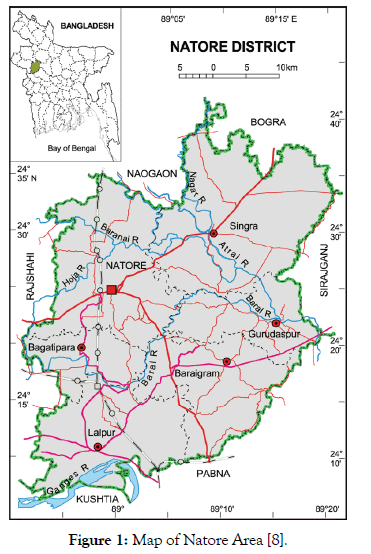
Figure 1: Map of Natore Area [8].
Sample selection
For this study 11 shops were selected among four upazilas (NatorSadar, Baraigram, Lalpur and Bagatipara) as shown in Table 1. Among 11 shops, 4 of them were processing shop (P) and 7 of them were collection shop (C), locally known as vangri.
Table 1: Sample distribution among four Upazilas of Natore District.
| Name of Upazilas | No of Shop |
|---|---|
| NatorSadar | 3 |
| Baraigram | 4 |
| Lalpur | 2 |
| Bagatipara | 2 |
Questionnaire survey
A questionnaire survey based on 11 questions was conducted in 4 upazila. The selected 4 upazilas are, referred as Natoreshadar (N), Bagatipara (BA), Baraigram (BO) & Lalpur (L). The survey was done by conducting direct interview of shop owners (Collection shop & processing shop) across the district between November 2019 and January 2020. The survey included questions about size and type of shops, number of workers, salary of the workers, amount of waste collection, the process of collecting plastic waste, buying and selling price of the plastic waste and destination of the recycled plastic.
Data analysis
After getting the survey information’s the data was processed by Microsoft excel 2019.
Results and Discussions
Plastic recycling process at processing shop
Plastic waste is basically collected from households by local scavengers and sold it to local collection shops known as vangri. Collection shop owners sell them to processing shops. In the processing shop they store the plastic wastes (Figure 2a). They categorize them into 3 types i.e. a). Pet bottle (PB), b) hard plastic (processed) (HP1) and c) hard plastic (Unprocessed) (HP2) locally known as molam. PB’s are mostly soft drinks or water bottle and hard plastics are two types that are found, one is HP1 these are recycled in the district and turned into raw material for future processing such as, chairs, pen, toilet cleaner container, mobile container etc. Whereas there is another kind of plastic HP2 which are non-recycled, this type of plastic is hard and cannot be processed in Natore area processing shops, such as water filter, motorbike girder, refrigerator wastage etc. The plastics are then put in shredding machine to get the plastic in desired shape and size as shown in Figure 2b. After shredding (Figure 2c) they wash the plastic with detergent in order to clean the recycled material. After drying the shredded plastic (Figure 2d) the plastic is packed for transportation (Figure 2e). According to shop owners most of the recycled plastic is transported to Islambagh Dhaka where plastic is turned into mold.
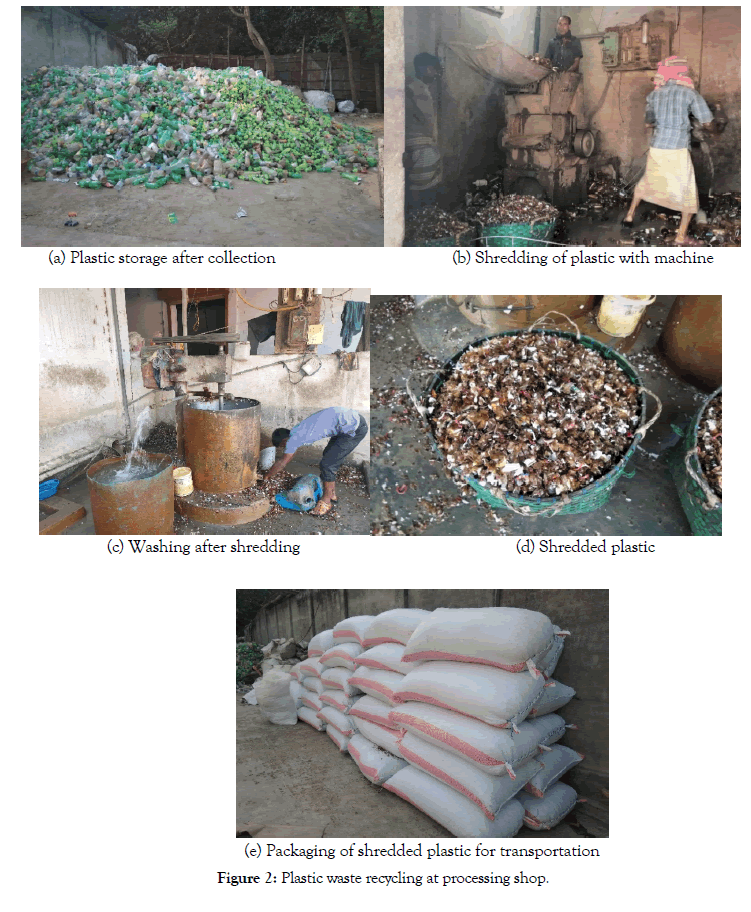
Figure 2: Plastic waste recycling at processing shop.
Size of the shop
There are two types of shops in the district, Collection shop and processing shop. In Figure 3, it was found that average size of collection shops in Natore district is 3777 ± 2160 sq/ft whereas processing shop size was 13513 ± 7686 sq/ft on average. Usually, the collection shop is used as temporary storage until the selling of the plastic waste to processing shop of small amount of waste that is why collection shops are smaller in size. On the other hand, processing shops are used as storage, post shredding and after shredding, wash, and packaging purposes. That’s why processing shops are bigger in size. Meanwhile in Dhaka city small shops are around 200 to 2000 sq/ft in size [9] which is smaller than Natore area. The reason of larger size of collection shop at Natore area may be the low land price compare to Dhaka city.
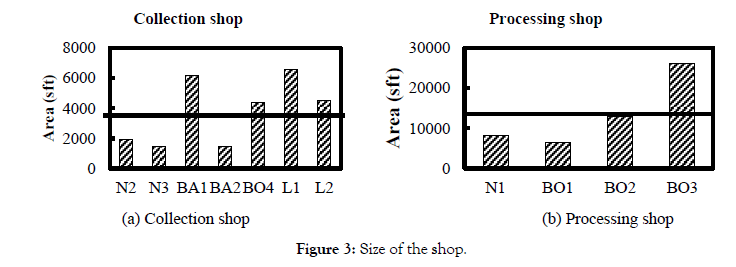
Figure 3: Size of the shop.
Number of the workers
It was found that in Natore area male number of workers were dominant than female number of workers. On average 6 male workers were found in all kind of shops whereas female workers were found in only two shops. Most of the workers both male and female aged around 20-35 years. No child workers were found in these shops; however, children do work as scavenger in local areas. It is shown in Figure 4. Meanwhile in Dhaka city 41% female and 31 % child workers are associated in the whole process [9].
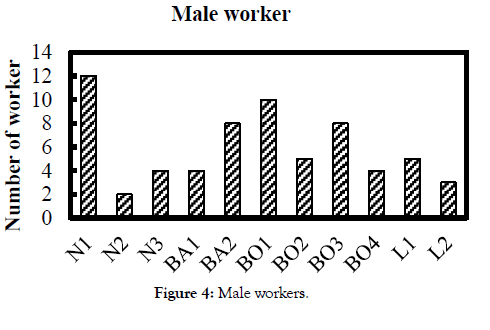
Figure 4: Male workers.
Salary of the worker
In the questionnaire survey one of the objectives were, how much money the workers earn on everyday basis. Shown in Figure 5, processing shop and collections shops were paying their workers almost same amount of money. On average the workers depending on their skills earns 270 BDT each day, male female indiscriminate. Their working hour is 8 AM to 6 PM. Meanwhile in Dhaka city workers associated in waste management sector earns about 161 BDT per day [9] with a working day of 8 to 10 hours 7 days a week [9]. Whereas, in Natore area, workers are allowed to work 6 days a week. The possible reason of high earning in Natore area is lack of skilled person in this sector compared to Dhaka City.
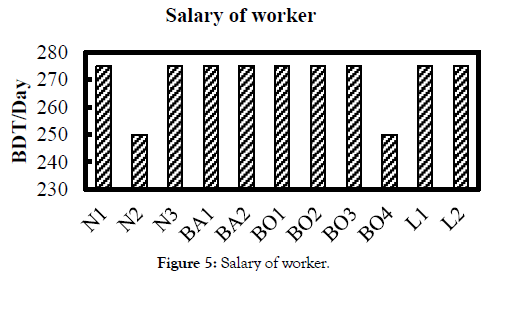
Figure 5: Salary of worker.
Amount of waste
According to the owners and workers, collection shops in Natore district collect about 1400 ± 70.72 kg (1.54 ton) worth waste each week. Meanwhile processing shops acquire and process around 970 ± 29.86 kg (1.069 ton) worth waste each week, shown in Figure 6. In the end of the year collection shops and processing shops collect and process around 67000 kg (73.85 ton) and 47760 kg (52.64 ton) of plastic waste and transport them to Dhaka for final recycling. It was also found that, there are 42 collection shops and 11 processing shops those are capable of collecting and processing about 443 tons and 145 tons of plastic waste respectfully in a year. This indicates the Natore area contributes 0.14 % of the total plastic waste recycled in Bangladesh as per Hossain & Shams report [3].
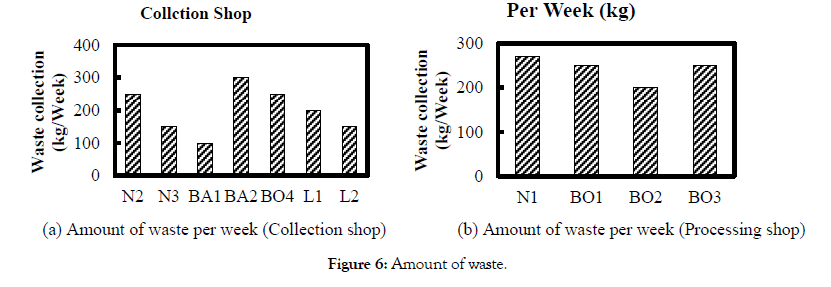
Figure 6: Amount of waste.
Price of the plastic waste
There are 3 different type of plastic wastes that are collected and processed. In Figure 7 it is seen that, in collections shops the buying prices of PB are 10-12, HP1 20-30 and HP2 are 5-7 BDT/kg respectively. And sells them for PB 12-16, HP1 30-50 and HP2 7-10 BDT/kg respectively. Meanwhile in processing shops they buy PB for 12, HP1 for 20-30 and HP2 for 7 BDT/kg respectively and after processing they sell them for, PB 17-18, HP1 40-50 and HP2 10 BDT/kg respectively. However, the price varies a lot depending on weather and market. Also, there is no exact rate of such products and no fixed buyer or seller. It is not always necessary for processing shops to buy plastic waste from local collection shops; they also buy them from local scavengers.
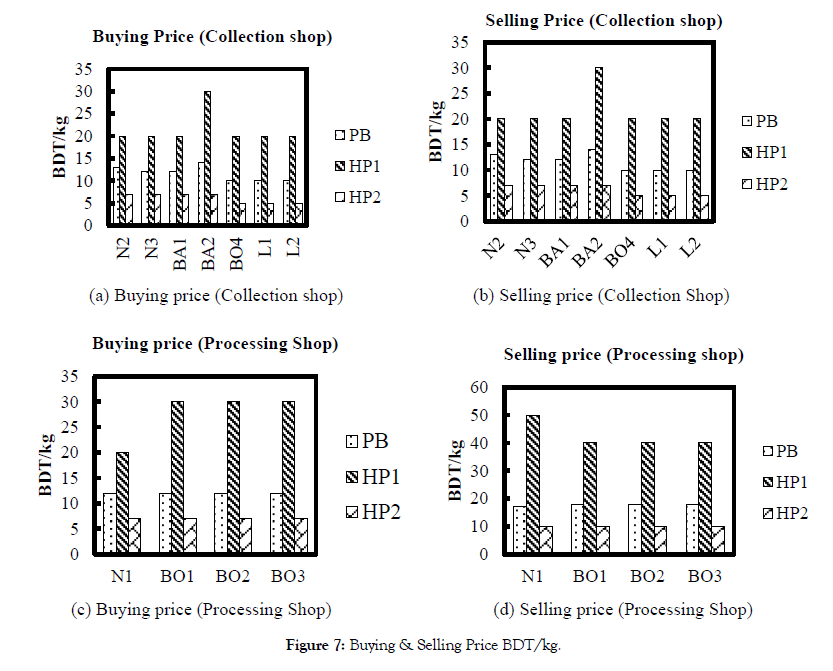
Figure 7: Buying & Selling Price BDT/kg.
Conclusion
In this study the condition of plastic waste recycling process in Natore district were discussed. The scenario of the selected areas (NatoreSadar, Boraigram, Bagatipara&Lalpur) were presented by the field survey. It was a great concern about collecting the authentic data but it may vary a little bit. Approximately the best possible data were selected. The number of collecting & processing shop as well as size of the shop, number of workers, salary of the workers, amount of waste & the buying & the selling price was considered in this study. All the data were collected by a questionnaire survey. No related data were found about Natore District. So, the data was not compared with any other data.
The summary of the finding from this survey is given below.
• There are three types of plastic waste is being recycled or processed in Natore area. They are pet bottles (PB), hard plastic processed (HP 1) and hard plastic non-processed (HP2).
• Two types of shops that are involved in the process, collection shops and processing shops. Although scavengers are the people who collect wastes from households and streets.
• Collection shops are around 3777 ± 2160sq/ft in size and processing shops are 13513 ± 7686sq/ft in size.
• On average 6 people work in each type of shops, aged from 20 to 35 years and women are less involved in this sector.
• People work mostly on 270 BDT on average pay day.
• Collection shops collect 1400 ± 70.72 kg (1.54 ton) and processing shops collect 970 ± 29.86 kg (1.069 ton) plastic waste every week. Eventually all collection shops and processing shops of these 4 upazila collect and process around 443 tons and 145 tons of plastic waste in a year
• Price of the products are a bit unstable. However, in general pet bottles are bought 12 BDT/kg and sold to industry on 17/18 BDT/kg, Hard plastic (processed) is sold for 45-50 BDT/kg and Hard plastic (Unprocessed) is sold for 10 BDT/ kg for final recycle.
• All processed products are transported to industries in Islambagh Dhaka, who turns the recycled plastic into mold for production.
From the information above it can be concluded that, the plastic waste recycling practice in Naotre district is not being governed properly. About 400+ tons of plastic waste is being recycled by these shops. This industry is not being properly monitored by the authority. This industry is keeping the environment a little safer from the long-lasting damage of plastic waste. People working in this sector are not getting paid enough.
REFERENCES
- https://www.thebalancesmb.com/how-long-does-it-take-garbage-to-decompose-2878033#:~:text=Plastic%20Waste&text=Normally%2C%20plastic%20items%20can%20take,take%20450%20years%20or%20more.
- https://www.nationalgeographic.org/article/whopping-91-percent-plastic-isnt-recycled/#:~:text=The%20new%20study%2C%20published%20Wednesday,nine%20percent%20has%20been%20recycled.
- Hossain M, Shams A. Export Potential of Recycled Plastic: A Study on Bangladesh. Asian Soc Sci. 2020;16(3):12-28
- https://tbsnews.net/environment/bangladesh-drowns-8-lakh-tones-plastic-waste-year#:~:text=Because%20of%20the%20ever%2Dincreasing,the%20top%20plastic%20polluted%20countries.&text=Over%20the%20past%20five%20decades%2C%20plastic%20production%20has%20soared%20worldwide.
- Bari MN, Jamal P, Alam M Z. Solid Waste Recycling scenario of Rajshahi City, Bangladesh. In – Proceedings of the 21st Symposium of Malaysian Chemical Engineers (SOMChE) Challenges and Opportunities in Chemical Engineering for Sustainable Future 12 - 14th December, UPM Serdang, Selangor, Universiti Putra Malaysia. 2007.
- http://www.natore.gov.bd/site/page/143b2f12-1ab0-11e7-8120-286ed488c766/%E0%A6%8F%E0%A6%95%20%E0%A6%A8%E0%A6%9C%E0%A6%B0%E0%A7%87%20%E0%A6%A8%E0%A6%BE%E0%A6%9F%E0%A7%8B%E0%A6%B0
- https://latitude.to/map/bd/bangladesh/regions/rajshahi-division/natore-district
- http://heritageofnatore.blogspot.com/2014/01/district-map-of-natore.html
- Zahur M, Otoma S. Informal Waste Recycling Activities: A Case Study of Dhaka City, Bangladesh. In Proceedings of the Annual Conference of Japan Society of Material Cycles and Waste Management The 24th Annual Conference of Japan Society of Material Cycles and Waste Management 2013 (p. 671). Japan Society of Material Cycles and Waste Management.
Citation: Rahman MM, Shafkath ES, Rahman MA (2020) Plastic Waste Recycling Practice in Natore District, Bangladesh. Int J Waste Resour 10: 392. doi: 10.35248/2252-5211.20.10.392
Copyright: © 2020 Rahman MM, et al. This is an open access article distributed under the terms of the Creative Commons Attribution License, which permits unrestricted use, distribution, and reproduction in any medium, provided the original work is properly cited.

